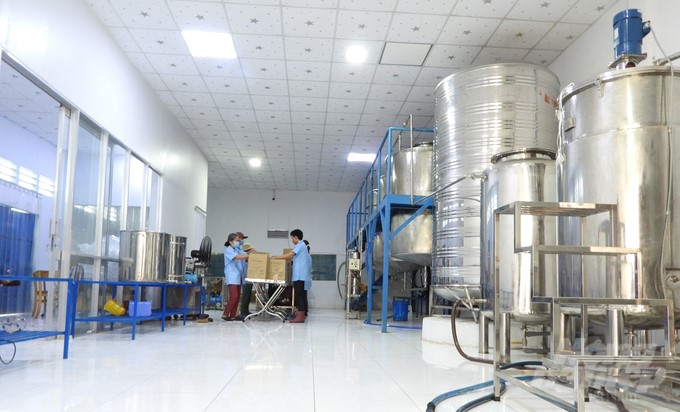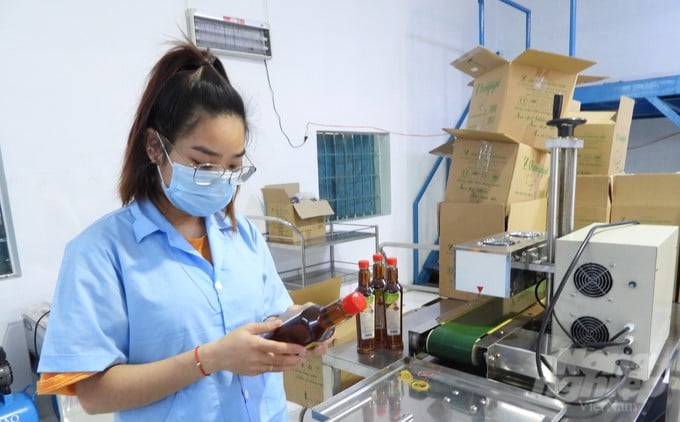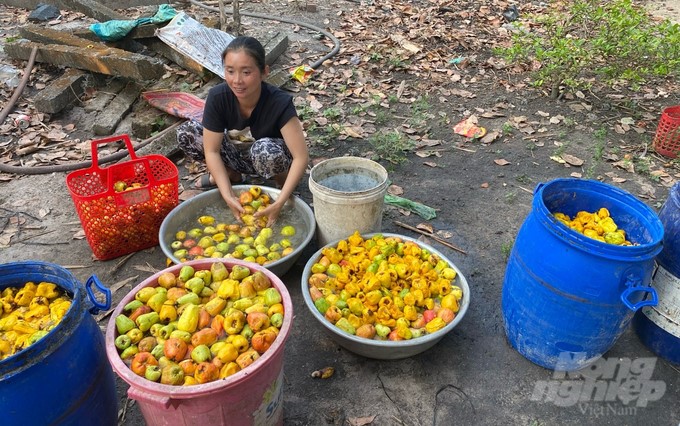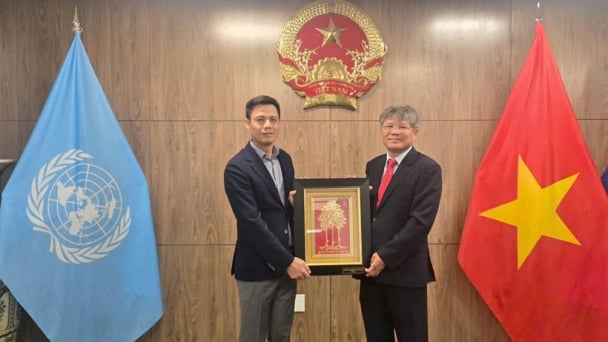May 21, 2025 | 15:34 GMT +7
May 21, 2025 | 15:34 GMT +7
Hotline: 0913.378.918
May 21, 2025 | 15:34 GMT +7
Hotline: 0913.378.918

Inside the factory producing fish sauce from cashew fruits of Vuong Ngoc Vegan Company. Photo: Tran Trung.
Although cashew trees are not the staple crop, with creativity, Tay Ninh people have made something impossible become possible. Bottles of fish sauce made from seemingly discarded cashew fruits have been well received by consumers and have gradually gained a foothold in the market.
As one of the leading units in vegetarian food production, realizing the potential of cashew fruits, Vuong Ngoc Vegan Co., Ltd. in Hoa Thanh town (Tay Ninh province) has devoted a lot of effort to turning them into typical vegetarian food. Thanks to methodical and scientific production, combining heirloom brewing secrets and modern closed technology that ensures food safety and hygiene, Vuong Ngoc Vegan's fish sauce bottles not only serve the domestic market but are also exported to demanding markets such as the US and EU.
Ms. Au Vuong Ngoc, Director of Vuong Ngoc Vegan Co., Ltd., shared that Vietnam is one of the world's leading countries in growing and exporting cashew kernels. However, the portion of cashew nuts used is only a small part protruding from cashew fruits, while the majority of cashew fruits are not effectively utilized and are even discarded. This is an endless resource; turning this waste product into profit is not simple, but Vuong Ngoc Vegan has done it.
“Cashew fruit belongs to the group that has a sharp increase in respiration intensity after harvest. The flesh of the cashew fruit contains a lot of acid and is easily precipitated in the environment. Ripe fruit juice contains 85% water with a sugar content of 8-10%, mainly reducing sugar. In addition, polyphenols in cashew fruit juice causing a bitter taste and residual tannins are also big challenges. However, with our own method, we were successful," Ms. Ngoc shared.

Vuong Ngoc's premium vegetarian fish sauce bottles not only serve the domestic market but are also widely exported. Photo: Tran Trung
To create 100 liters of pure cashew fish sauce, 300 kg of fresh, ripe cashew nuts are carefully selected. The production process goes through preliminary processing steps such as washing, cutting, mixing with the correct amount of salt, and then fermenting. After 4 months, the fish sauce is combined with a number of additives according to the family recipe to produce standard bottles of fish sauce.
Because cashew fruits are only harvested seasonally, the company has signed a contract to purchase fresh cashew fruits from cashew growers in the locality and neighboring provinces at a price of VND 3,000/kg. At the same time, the company transfers composting techniques and supports composting equipment right at the garden, helping to reduce production costs and improve product quality. The company buys back raw fish sauce at a price of VND 50,000/liter, helping farmers increase their income up to VND 20 million/crop/ha.
“Currently, the company's production line reaches about 150,000 bottles of fish sauce/day. In addition to cashew fish sauce, the company also develops other products such as Dong Co fish sauce, pineapple fish sauce, and fish sauce from some other typical fruits, ensuring the line operates smoothly and with enough capacity," Ms. Ngoc said.
With the motto "Vegetarian eating, remembering Vuong Ngoc," the company's products are now present in most supermarkets and food stores nationwide. Aiming to bring Vietnamese agricultural products to the world, the company has successfully exported to the US and EU. At the same time, Vuong Ngoc Vegan is completing procedures to apply for Halal certification to export to Muslim countries and increase production capacity to 2 million liters of fish sauce/year.

The company gradually links in purchasing cashew fruits of people inside and outside the locality, helping people get rich. Photo: Tran Trung.
Mr. Nguyen Dinh Xuan, Director of the Tay Ninh Department of Agriculture and Rural Development, emphasized that Vietnam is an agricultural country with a very large and diverse amount of waste products and by-products in the processing process. If fully utilized, these waste products will become a renewable resource, not only protecting the environment but also bringing great economic and social value.
“In the current cashew production industry, cashew fruits are often considered a waste product. Not only Vuong Ngoc Vegan, we welcome any business that effectively utilizes cashew fruits," Mr. Nguyen Dinh Xuan affirmed.
Translated by Thu Huyen

(VAN) VRG recently conducted a visit and working trip to the United States to demonstrate its efforts in redefining the role of rubber enterprises in the global value chain.

(VAN) In 2024, over 295 million people across 53 countries and territories faced acute hunger—an increase of almost 14 million people compared to 2023, while the number of people facing catastrophic levels of hunger reached a record high.

(VAN) World Environment Day 2025 (June 5) carries the theme 'Beat Plastic Pollution' continuing to emphasize the global urgency of addressing the plastic waste crisis.

(VAN) This was the assessment shared by experts at the workshop titled 'Assessing the Role and Potential of Low-Emission Rice Production Systems in Vietnam,' held on the morning of May 19.

(VAN) Cai Rong Port is the fisheries control center of Quang Ninh, helping to monitor fishing vessels, combat IUU fishing, and remove the EC's 'yellow card'.

(VAN) The German Agricultural Society (DLG) explores the possibility of establishing a mechanization service center in Vietnam’s Mekong Delta to support farmers in accessing and utilizing advanced machinery.

(VAN) On May 16, the Department of Water Resources Management, in collaboration with the Food and Agriculture Organization of the United Nations (FAO), held a signing ceremony for the GEF-8 project document.